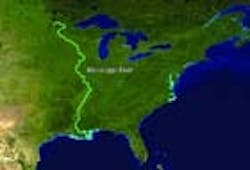New Initiative Focuses on Mississippi River Basin Water Quality Improvement
A new initiative aims to reduce nutrient and sediment movement into the largest river system in the U.S., the Mississippi River. Monsanto is partnering with multiple agricultural and conservation groups that are working with farmers to help reduce runoff from the Mississippi River into the Gulf of Mexico.
The Nature Conservancy, the Iowa Soybean Association and Delta Wildlife are all working collaboratively with farmers to remove nutrients and sediment from agricultural runoff in the Mississippi River Basin. The National Audubon Society is working with homeowners and others to implement measures to improve wildlife habitat and the quality of water entering the Mississippi River. The new initiative by Monsanto will advance the group's work and help determine the effectiveness of various conservation measures on improving wildlife habitat and water quality.
“The Mississippi River is an ecological treasure and an economic powerhouse,” said Michael Reuter, who oversees The Nature Conservancy's Great Rivers Partnership, which was created to help advance conservation of the world's major river systems, including the Mississippi. “This new effort by Monsanto will help show how we can make farming and conservation in the Mississippi River Basin more compatible so that nature and people alike benefit from improved water quality and enhanced wildlife habitat.”
“We're proud to work on this bold conservation initiative which we believe offers a sustainable vision for agricultural landscapes wherein farmers can support our world's growing needs for food, fiber and fuel in ways that not only preserve water quality, but also support diverse and abundant wildlife populations,” said Jerry Steiner, executive vice president at Monsanto. “We believe this initiative can serve as an important stepping stone toward the goal of preserving natural resources and wildlife in the Mississippi River Basin for future generations.”
“Farmers are emerging in key leadership roles through their investments, and by participating in the planning and implementation of practices that perform environmentally. It's our goal to support them and help them make meaningful progress,” said Roger Wolf, director of environmental programs at the Iowa Soybean Association. “Our goal is to use science—research and data—to systematically develop and implement a suite of management techniques that help production agriculture measurably improve stewardship while maintaining or increasing profitability.”
“Delta Wildlife is pleased to join forces with Monsanto, The Nature Conservancy, and the Iowa Soybean Association to implement a large-scale project that will improve water quality in the Mississippi River and Gulf of Mexico,” said Bobby Carson, chairman of the Delta Wildlife Board of Directors. 'While significant environmental benefits will certainly accrue from this project, it will also nurture a more sustainable and profitable future for agriculture.'
“Audubon is pleased to be part of this effort to foster a sustainable Mississippi River watershed for people and wildlife,” said Roger Still, vice president of Audubon's Mississippi River Initiative. “We are committed to engaging individuals to take action in their own lives to help address the water quality and habitat issues in the watershed.”
Source: PR Newswire
